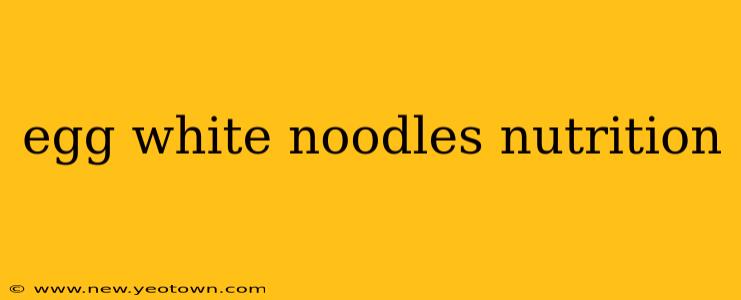Let's be honest, noodles are a comfort food staple across cultures. But when you're watching your weight or aiming for a healthier diet, the high-carb, sometimes-heavy nature of traditional noodles can be a concern. Enter egg white noodles – a lighter, potentially healthier alternative that's gaining popularity. But what exactly makes them tick from a nutritional standpoint? This isn't just about calories; we'll delve into the macro and micronutrients, exploring the benefits and potential drawbacks. Think of this as your ultimate guide to understanding egg white noodles' nutritional profile.
What are Egg White Noodles Made Of?
The story begins simply: egg whites. Unlike traditional wheat noodles or even some rice noodles, egg white noodles are primarily made from—you guessed it—egg whites. These are whisked and then often combined with a small amount of other ingredients like water and sometimes a touch of starch for binding. This simple composition is what gives them their unique nutritional characteristics. The absence of yolk significantly impacts the fat and cholesterol content compared to regular egg noodles.
Egg White Noodles Nutrition Facts: A Closer Look
The nutritional content of egg white noodles can vary slightly depending on the brand and specific recipe. However, a general picture emerges showing them as relatively low in calories and fat, while providing a decent source of protein. Let's break down the key components:
-
Protein: Egg white noodles are a good source of protein, primarily due to the egg white content. Protein is crucial for building and repairing tissues, supporting a healthy metabolism, and feeling satiated.
-
Carbohydrates: While they contain carbohydrates, the amount is generally lower than in traditional wheat noodles. The type of carbohydrate also influences the glycemic index (GI), which measures how quickly a food raises blood sugar levels.
-
Fat: The significant advantage here is the very low fat content. This makes them a suitable choice for those looking to manage their fat intake.
-
Vitamins and Minerals: Egg whites are a decent source of certain vitamins and minerals, though the amounts in noodles may vary. You'll find some B vitamins crucial for energy production and cell function.
Are Egg White Noodles Good for Weight Loss?
This is a question many people ask. The lower calorie and fat content compared to other noodles makes them a potentially helpful tool in a weight-management plan. However, it's crucial to remember that weight loss is about overall caloric intake and expenditure. While egg white noodles can contribute to a healthier diet, they are not a magic bullet. Portion control and a balanced overall diet remain essential.
How Do Egg White Noodles Compare to Other Noodles?
Let's compare them to some common noodle alternatives:
-
Wheat Noodles: Generally higher in calories, carbohydrates, and fat.
-
Rice Noodles: Lower in calories than wheat noodles but can still have a higher carbohydrate content.
-
Shirataki Noodles: These are very low in calories and carbs, primarily made from a plant-derived fiber, but some people find their texture less appealing.
What are the Potential Downsides of Egg White Noodles?
While generally considered a healthier option, egg white noodles do have some potential drawbacks:
-
Texture: Some find the texture different from traditional noodles. It can be more delicate and slightly less chewy.
-
Limited Micronutrients: Compared to whole-grain noodles, they may lack some of the fiber and micronutrients present in whole grains.
-
Potential Allergens: Individuals with egg allergies should obviously avoid them.
Are Egg White Noodles Gluten-Free?
Yes, egg white noodles are naturally gluten-free, making them a suitable option for those with celiac disease or gluten sensitivity. Always check the label, though, to ensure that no cross-contamination has occurred during manufacturing.
Can Egg White Noodles Be Part of a Healthy Diet?
Absolutely! Egg white noodles can be a valuable addition to a healthy, balanced diet. They offer a lower-calorie, lower-fat alternative to traditional noodles, making them suitable for those watching their weight or aiming for a healthier eating style. Remember, however, that they should be part of a broader dietary approach that incorporates plenty of fruits, vegetables, and other nutrient-rich foods. Moderation and a balanced approach are always key.

